Olympics will come and go but Zika is here to stay, scientists say

RIO DE JANEIRO - Battered by a presidential impeachment and the worst recession since the Great Depression, Brazil is getting a rare bit of relief as Rio de Janeiro prepares to host the Olympics: declining numbers of Zika infections.
Since the start of the Zika outbreak, which wreaked havoc across Brazil's northeast earlier this year, many physicians and would-be visitors have worried the Games could be a catalyst to spread the virus internationally.
Some athletes, including the world's top-ranked golfer, have said they will stay home to avoid infection because of concerns over health complications caused by Zika, notably microcephaly, a birth defect among babies of pregnant mothers infected by the virus.
Recently, however, cooler-than-normal temperatures during the southern hemisphere winter, coupled with efforts to eliminate breeding grounds for the mosquitoes that spread Zika, have cut infections by about 90 percent from a February peak, when more than 16,000 cases were reported in one week.
In Rio, an ebbing of Zika fears is reassuring authorities just over a month before the Olympics start on Aug. 5.
"Rio is not the Zika nightmare that people worried about," says Pedro Vansconelos, director of the Evandro Chagas Institute, a Brazilian research facility, and a member of the World Health Organization's emergency committee for Zika.
Hot, humid weather, which fosters mosquito reproduction, helped Zika spread rapidly from Brazil to more than 60 countries and territories.
A hot summer in Rio at the start of the year led to a spike in other mosquito-borne illnesses, such as dengue and Chikungunya. But the local outbreak of Zika was not as severe or as widespread as in the northeast, confounding scientists.
Now, with seasonal temperatures in Rio falling as low as 8 Celsius (46 Fahrenheit), infection rates for Zika, dengue and Chikungunya are waning.
According to the state government, Zika infections in Rio fell from more than 3,500 per week in February to less than 200 recently. Cases of dengue fell from 4,500 per week to under 500, while Chikungunya dropped from nearly 700 to under 50.
Statistics paint only a partial picture of Zika infections because the illness presents only minor symptoms in most people and remains difficult to diagnose.
And if temperatures rise, as they have during waves of summer-like heat in recent winters, the mosquito population could rebound and lead to more Zika transmission even before hot weather returns in earnest later in the year.
But Brazil's health ministry, local officials and Olympic organizers insist Rio will be safe for visitors. Public health workers are scouring Olympic venues and tourist sites for puddles, stagnant water and other areas mosquitoes lay eggs. -Reuters







